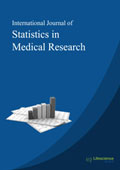IJSMR
|
|
Abstract: Cluster-randomized clinical trials (CRT) are trials in which the unit of randomization is not a participant but a group (e.g. healthcare systems or community centers). They are suitable when the intervention applies naturally to the cluster (e.g. healthcare policy); when lack of independence among participants may occur (e.g. nursing home hygiene); or when it is most ethical to apply an intervention to all within a group (e.g. school-level immunization). Because participants in the same cluster receive the same intervention, CRT may approximate clinical practice, and may produce generalizable findings. However, when not properly designed or interpreted, CRT may induce biased results. CRT designs have features that add complexity to statistical estimation and inference. Chief among these is the cluster-level correlation in response measurements induced by the randomization. A critical consideration is the experimental unit of inference; often it is desirable to consider intervention effects at the level of the individual rather than the cluster. Finally, given that the number of clusters available may be limited, simple forms of randomization may not achieve balance between intervention and control arms at either the cluster- or participant-level. In non-clustered clinical trials, balance of key factors may be easier to achieve because the sample can be homogenous by exclusion of participants with multiple chronic conditions (MCC). CRTs, which are often pragmatic, may eschew such restrictions. Failure to account for imbalance may induce bias and reducing validity. This article focuses on the complexities of randomization in the design of CRTs, such as the inclusion of patients with MCC, and imbalances in covariate factors across clusters. Keywords: Experimental Design, Randomization, Cluster Randomized Trials, Multiple Chronic Conditions.Download Full Article |
Acknowledgement | International Journal of Statistics in Medical Research
Lifescience Global would like to appreciate and thank all the reviewers and authors for their rigorous and conscientious efforts for the International Journal of Statistics in Medical Research. Below is the list of people who contributed towards the success of the journal during 2015.
|
Lifescience Global would like to appreciate and thank all the reviewers and authors for their rigorous and conscientious efforts for the International Journal of Statistics in Medical Research. Below is the list of people who contributed towards the success of the journal during 2014.
|
Co-Editor in Chief- Profile

Prof. Dr. of Sc. Kartlos Joseph Kachiashvili: He is Professor at Georgian Technical University, Faculty of Informatics and Control Systems, Senior Scientific Worker of the I. Vekua Institute of Applied Mathematics of the Tbilisi State University and Senior Scientific Worker of the Muskhelishvili Institute of Computational Mathematics of the Georgian Technical University (Tbilisi, Georgia). He has held numerous positions in scientific research institutes and universities in Georgia, Russia and Pakistan, including: engineer, scientific worker, Head of Laboratory, Head of Department, Director of National Center, Professor, and Rector of educational institute. He has published over 200 scientific papers published in various esteemed international journals, seven monographs and three books in Georgia, Ukraine, United States and Indonesia. He is a member of various professional bodies and editorial boards of international scientific journals. He has received numerous prestigious awards. His research interests are: mathematical statistics, data analysis (environmental, agricultural, medical), mathematical modeling and simulation, new computer technologies development, system analysis (environmental water pollution), and computing mathematics.
Associate Editor - Ernesto Roldan-Valadez

Co-Editor in Chief- Profile

Professor Danh V. Nguyen, PhD: Dr. Nguyen is Professor in the Department of Medicine at the University of California (UC), Irvine, School of Medicine since 2013. He was Professor in the Division Biostatistics, Department of Public Health Sciences, at UC Davis (2003-2013). He has published extensively in both biostatistics methodology and biomedical/clinical applications. In biostatistics, he has contributed wide-ranging novel methods for classification/prediction in high-dimensional data, including genomics and imaging data; time-varying effects modeling; cases series methods; longitudinal analysis; sparse data; joint modeling; spatiotemporal modeling; and profiling health care providers among others. His substantive research areas of focus include fragile X spectrum, congenital diaphragmatic hernia, and dialysis patient populations.


